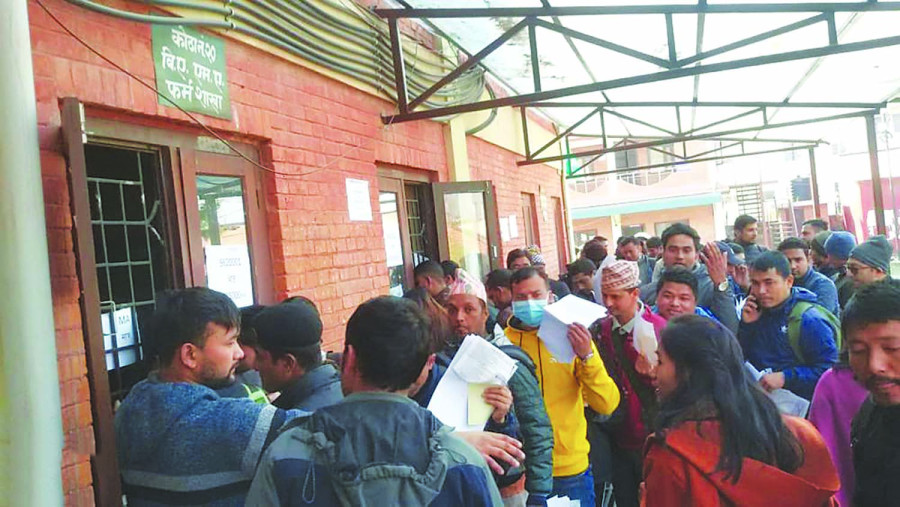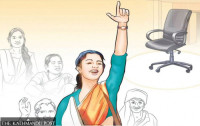National
Nepal’s largest university trifles with students’ future and aspirations
Tribhuvan University’s failure to follow the academic calendar reeks of negligence.
Mimamsha Dhungel
‘Frantically experiencing an existential crisis because of Tribhuvan University’, Nishma Gautam, a student of the university, posted on her Instagram recently. She also posted a video sharing her ordeal and calling out the university for its lack of responsibility.
Several students responded by saying they could relate to Gautam’s predicament.
Twenty-five-year-old Gautam, a BA Psychology student at Padma Kanya Campus affiliated with the Tribhuvan University (TU), missed her Foundations of Psychology practical examinations in her first year in 2017. The following year as a second-year student, she went to sit for a re-examination for her missed practical exam. She, however, had not carried her first-year admit card with her, and used her second year’s symbol number to sit for the exam. But nobody at the exam centre including the invigilators verified her symbol number.
When the result of the exam was published, her paper was marked under somebody else’s name. “My admit card issue pushed me back by one more year which meant I had to sit for the examination again.”
For the next two years, all educational activities, among others, in Nepal were pushed back due to the Covid pandemic.
Finally, in August 2021, Gautam appeared for the re-exam of her first-year practical. But it was only 14 months later that she got her exam result.
“The university usually publishes results within eight months of an exam which in itself is a lengthy wait for students,” said Gautam. “In my case, I had to wait for more than a year which led to me missing out on some great academic opportunities.”
Every time Gautam frantically visited the Department of Officer of Controller of Examination in Balkhu to inquire about the results, she returned disappointed. “First, they assured me that the results will be announced in New Year 2022. I made my plans accordingly to pursue Post-Graduate Diploma in Counselling Psychology. I enrolled in Counseling Psychology and Social Studies classes in Kathmandu at a TU-affiliated campus,” she said. “I was confident that I would receive my first-year’s back paper result by the time I sat for my first semester exam for the PG Diploma course.”
Gautam also applied for the Chevening scholarship, a one-year master’s degree programme funded by the UK government.
“I applied for Chevening because I knew that by the time my Post-Graduate diploma ended, I could directly pursue my Master’s degree in the UK,” Gautam said. ‘Through Chevening, I applied to three renowned universities—Goldsmith University, Kingston University, and the University of Plymouth. My joy knew no bounds when I was selected for the Chevening scholarship. To get the final letter, I had to submit my Bachelor’s transcript before July 14 2022,” she said.
Gautam did not want to miss this once-in-a-lifetime opportunity but it looked like she would since she was still awaiting her BA first-year result.
It had been more than a year of waiting so she appealed to the TU to release her academic transcripts. To her dismay, the university officials came up with excuses. “They would tell me that they were overwhelmed with work because of the Covid pandemic and it would take a while for them to release my transcripts,” said Gautam. ‘I made many visits to the office but none of my visits bore results.
Contrary to what was promised, Gautam finally got her result for BA first year in December 2022. By then she had already missed the transcript submission deadline for the Chevening scholarship. She lost the scholarship.
BBS fourth year students who sat for their examination between January 7 and 18 last year also faced a similar predicament. They had to wait for their results for eight months after their examination was conducted. This delay affected over 600 affiliated and constituent colleges of the Tribhuvan University that offer BBS courses.
Yajju Nepali, a 23-year-old management student, lost almost a year to delayed results. “My friends from Business Administration or Social Work streams got their results one year before me. They could pursue their Master’s degree right away. Meanwhile, I lost a year of my academic life. I finally got my results this year in January.”
Nepali, like so many BBS students of the 2022 batch, suffered because the university misplaced the answer sheets of BBS fourth year students from Damak Multiple Campus, Jhapa. The university later said answer sheets of the ‘Research Methodology’ paper from symbol number 702020001 to 702020251 were lost which led to the delay in publishing the results of BBS 2022 batch.
The students had to sit for a re-examination on January 7, 2023, almost a year after sitting the regular exams.
“I was unaware of why our result was being delayed,” said Nepali. “But I lost two great opportunities while waiting for my results. I have been working as an accountant for the past five years but I could not make progress at work for lack of a BBS degree. I have had to forgo job offers because I don’t have a degree.”
Students across colleges affiliated with the TU have been adversely affected by the university’s lack of transparency, punctuality, and accountability towards their students.
This is not the first time the university has been negligent towards their students’ academic future. Back in 2021, the university published an incorrect transcript for BBA fourth-year students. The university had revised its system of allowing a first division to 3.5 GPA students. The updated system required the students to achieve a 3.7 GPA to qualify for a distinction. But when the university published the transcript of BBA fourth-year students, they did so adhering to the old format.
“This resulted in a five-month delay in results,” Sweksha Lakhe, 23 from Mahendra Multiple Campus, Nepalgunj told the Post.
Tribhuvan University was founded in 1959 A.D. The university has five institutes and four faculties that oversee the operation of 40 core departments, 62 constituent campuses, and 1,062 associated colleges in various subjects. Similarly, TU has four research centres. The university claims to meet the needs of a huge number of students despite being one of the world’s largest institutions in terms of size and programme diversity. However, university students feel that systematic failure inside the university impeded their academic pursuits rather than supplementing them.
“If you have a three-year Bachelor’s from TU like me, you can’t even apply to the Russell Group of universities which generate more than two-thirds of the world-class research conducted at UK universities,” said Gautam. ‘TU’s curriculums and the overall course design don’t even qualify for a decent international degree. If you have a three-year Bachelor’s degree from the university, you must have a one-year post-graduate diploma to qualify for a Master’s degree abroad.”
The largest university in Nepal which receives almost 70 percent of the allocated university budget from the government has failed to live up to the students’ expectations.
Dr Pramod Bhatta, assistant professor of Sociology at the TU and a senior researcher of education at Martin Chautari, a policy and research institute based in Kathmandu, says overwhelming negative feedback from students is an indication of how the university has failed to function. He blames the university’s highly centralised system for its failure to meet targets.
“The university has constantly been criticised for its mammoth organisational body,” he said. “The entire process of designing a curriculum, releasing examination routine, setting and dispatching questions, and collecting the answer sheets is a gruelling process. Since everything is centralised in Kathmandu, the process is time-consuming.”
When Kedar Bhakta Mathema was the vice-chancellor of TU in the 1900s, an academic calendar was proposed and enacted at the university. However, a strict academic calendar that guides and governs the entire process from student intake to examinations and results is lacking. A lack of direction to carry out functions of this ginormous institution is what adds up to the inefficiency, says Bhatta.
The Post reached out to several Tribhuvan University officials including Prof Dr Dharma Kanta Baskota, vice-chancellor of the university, requesting them to address the issues of the students but none of the officials was available for comments.
“Being a TU student is like being in a nail-biting thriller. You don’t know what curveball they will throw at you next,” said Aashika Gautam, a 22-year-old journalism student at the university. “Nothing is guaranteed—neither the examination schedule nor the result date.”




 8.69°C Kathmandu
8.69°C Kathmandu














